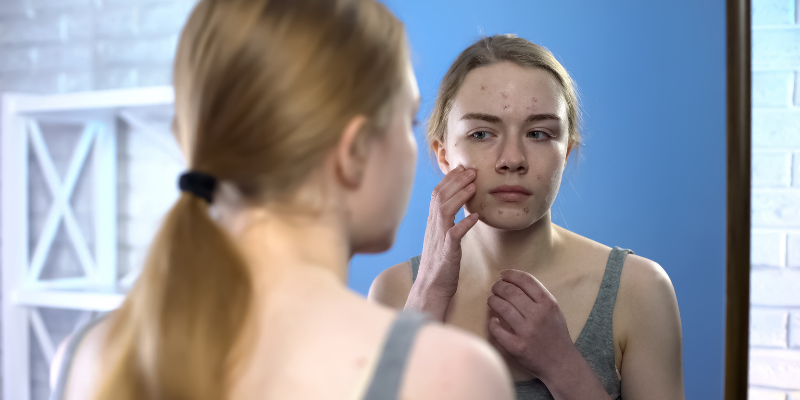Why Does Puberty Cause Acne?

There are many specific types of acne, one very common one being hormonal acne. This occurs when there is an imbalance of hormones within the body, which happens during puberty but can also occur in adulthood. This is why teenagers often struggle with acne.
Read on to learn more about the causes of hormonal acne during puberty and adulthood and how to treat it.
Increased Androgens and Acne
Acne is mostly affected by the male hormone testosterone – the family of male hormones is called androgens. Women and post-pubescent girls have androgens, too, just not as many as men and boys. When going through puberty, hormones go a bit crazy and can get out of balance. An increase in androgens increases oil production, which can clog pores and therefore cause acne.
The first step to blocking acne at puberty is to use a salicylic acid cleanser such as NoLIO in order to reduce the amount of sebum (oil) on the skin.
Acne Isn’t Just a Problem for Teens
There is a common misconception that acne is only a problem for teenagers. While acne often clears up as hormones begin to balance into adulthood, there are many reasons why hormonal acne can become a problem again as an adult.
Women tend to experience more instances of hormonal acne than men, as increased androgen hormones in women can cause excess oil production and clogged pores. A few common signs of hormonal acne in women include:
- Irregular menstruation
- Increased facial hair and acne
- Cystic acne along the jawline
Menopausal acne is also common among women in their 40s and 50s, due to a decrease in the hormone estrogen and/or an increase in androgens. Some hormone replacement therapies may also contribute to menopausal acne, as they can cause an imbalance in hormones as well.
What to Do If You Think Your Acne Is Caused by Hormones
If you are struggling with adult acne that you think may be caused by a hormone imbalance, talk to your dermatologist about oral medications such as contraceptives or spironolactone to help regulate hormones and eliminate this type of acne.
Using the right skincare regimen for your Baumann Skin Type® is equally important. Acne treatment products such as retinoids, salicylic acid, silver, and benzoyl peroxide may be appropriate, depending on your skin type. A glycolic acid cleanser such as Essopi Glycolic 10% Moisturizing Cleanser can help to exfoliate the skin and cleanse pores, especially if you have dry skin. Choose a cleanser for acne that is a match for your skin type. If you do not know your Baumann Skin Type®, find a physician partner in your area who can give you the validated skin type questionnaire to determine your skin type and develop a customized regimen based on your results.
Remember that diet affects acne as well, so pair prescription medications and the proper skincare regimen with healthy dietary choices. Reduce your intake of sugar and dairy, and eat plenty of anti-inflammatory foods to help manage acne.
Bottom Line
Acne caused by hormone imbalances can occur at puberty and in adulthood, though the proper treatment methods will change based on your age, gender, and specific situation. Work with a dermatologist to develop an acne treatment regimen that will work best for your skin type.
For more skincare tips and tricks from Dr. Baumann, don’t forget to follow Baumann Cosmetic on Facebook, Instagram, and YouTube.
©2020 Metabeauty, Inc.


